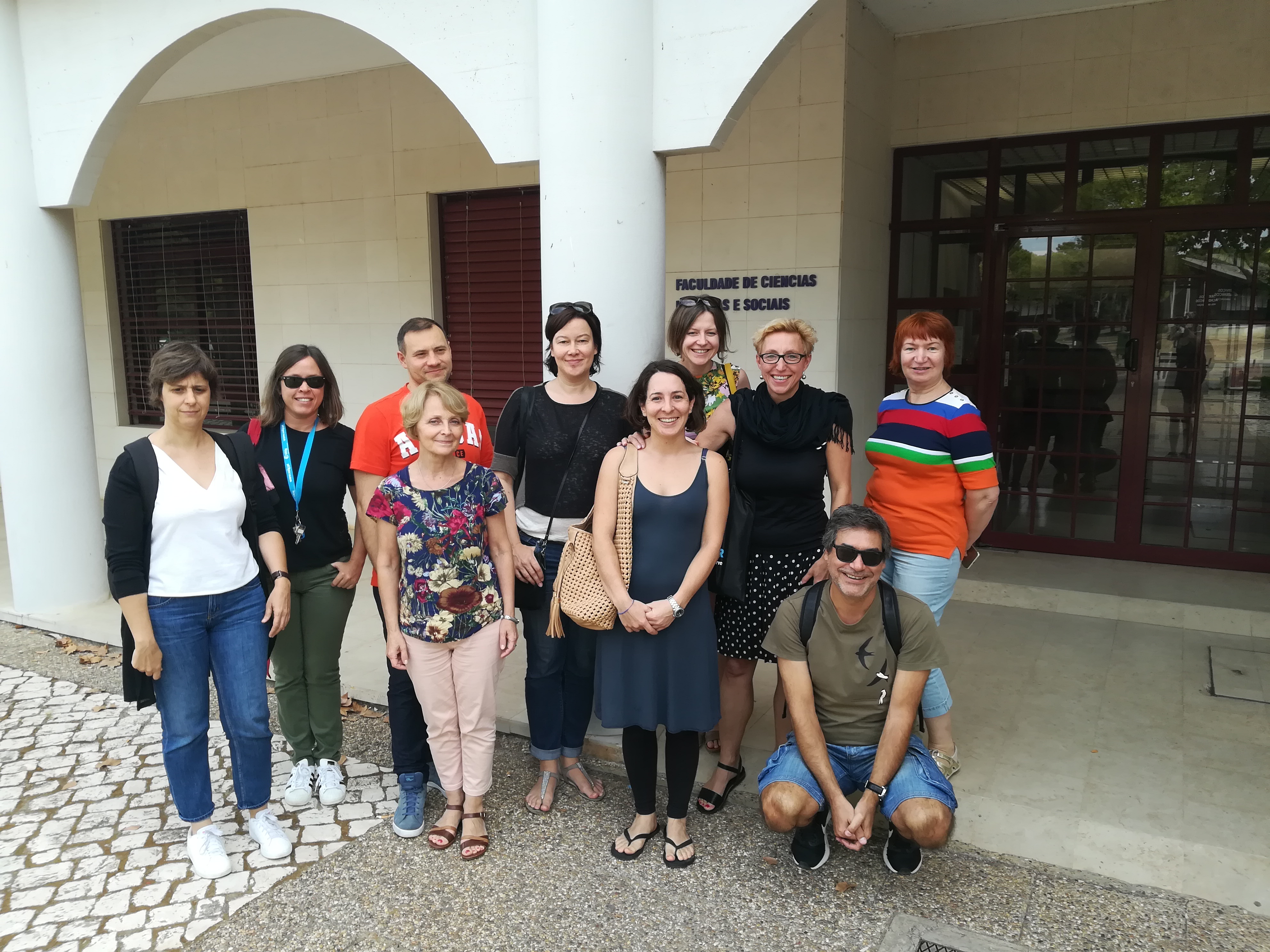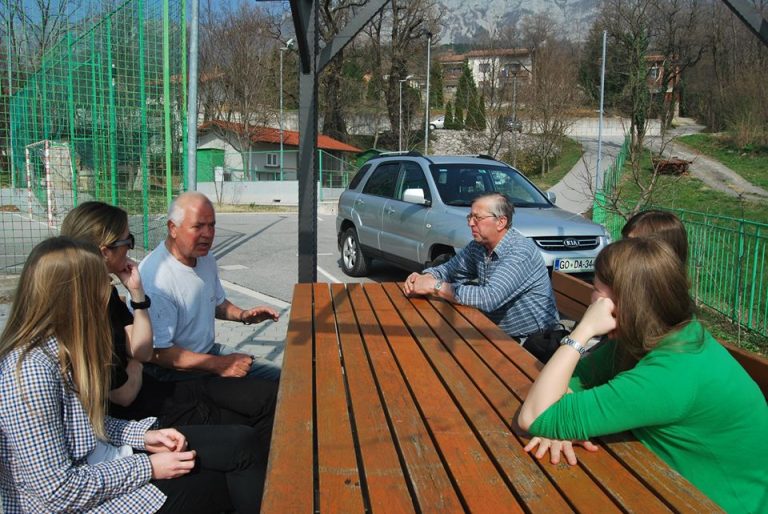The ageing population and longevity society brings up many challenges, such as lifelong learning, quality of life, financial security, social inclusion, availability and accessibility of social care and medical treatment for older people, but at the same time it also presents questions regarding the possibilities of keeping older people involved as active and equal members of society who can contribute to the development and empower social and cultural wealth of the community. Statistics for Slovenia and many European countries prove that men’s participation in learning and community practices in the third and fourth stages of life is significantly lower than by women, and that the consequences of (self)marginalization and isolation of older men are reflected in both their health and in quality of life.
The project Old Guys Say Yes to Community (Erasmus+, KA2) developed on the Faculty of Arts, University of Ljubljana and with European partners from Poland, Estonia and Portugal reveals errors and lost opportunities but also proposes possibilities, suggestions and good practices to foster participation of older people (particularly men 60+) in our societies with the aim of increasing their and our wellbeing, quality of life, happiness and health. Therefore we: a) evaluated wellbeing and involvement of older adults (particularly men 60+) in education and learning in their local environments; b) identified obstacles and opportunities for greater involvement of older adults (particularly men 60+) in community activities and communities of practice; c) and prepared concrete recommendations for local community authorities and non-governmental organisations to empower older people (particularly men 60+) in their communities.
The Recommendation letter for local community authorities in Slovenia therefore presents our main findings, which can foster strategy and policy implementation for lifelong learning, longevity society and ageing population in local environments (with the emphasis on older men). Recommendations are based on extensive qualitative research on inclusion of older men (60+) in local communities in Slovenia, which was carried out in the spring of 2017 in Ljubljana (district community Bežigrad), the municipality of Ajdovščina, and to a smaller extent in various parts of Slovenia. The research includes three focus groups, 98 in-depth half-structured interviews, 10 case studies of good practices, and a review of existing academic literature and Slovenian and European policies on education and inclusion of elderly adults of local communities for better quality of life.
A comprehensive document of recommendations for local community authorities in Slovenia is available for public discussion in Slovenia until the end of 2018. The main findings are summarised in nine points.
Read more ...
1) In the framework of national strategies and preparing action plans by different ministries, local and national authorities should support implementation of legislation that tackles:
a) financial and material vulnerability of older people,
b) high at-risk-of-poverty,
c) spatial exclusion,
d) labour, social and political participation among the older people, as well as
e) greater intergenerational cooperation, and
f) appropriate supportive environments for socialising and learning of older people (especially men 60+).
2) Because retirement is a critical stage in life that the elderly (and especially men) are not prepared for, and because Slovenia has cancelled formal retirement preparation programs, programs aiming to prepare the elderly for old age and give meaning to old age to those in the second stage of life (not just before retirement, but rather significantly earlier) should be promoted within public institutions and through NGOs. Young people should also be informed and educated about the process of ageing and about old age; the research has shown that activities in the first two life stages decisively determine cognitive, social and cultural capital in the third and fourth life stages. At the same time, this would encourage the wider society (and not just among older adults) to change the traditional and stereotypical views of old age and ageing.
3) Instead of forced and early retirement (ZUJF law, etc.), practices for a gradual transition to retirement (partial retirement, retirement with the possibility of occasional (non)formal participation, etc.) should be developed and aimed at any individual with motivation and interest in continuing employment or work. Good examples of encouraging positive perception of productivity (highly important for men) and creativity (highly important for women) could be done within public institutions. Inclusive longevity society could be developed through practices of old-new career; involving the elderly in mentoring, training, mediation, development, strategic, motivational, etc. roles/working groups/programs of institutions and companies; gradual replacement of ‘careers of male domination’, ‘identity of a functionary’, etc. At national level, laws should be drawn up to institutionalise gradual/partial retirement practices, ‘silver economy’, and to encourage economic integration of the elderly, etc. Organisations that develop ‘partnerships’ with older adults should be financially supported.
4) Despite our awareness of predictable demographic changes, we are facing an intense process of a) marginalisation (especially of impoverishment) of the elderly and b) disappearance of the elderly (especially men) from community due to self-isolation, uselessness, needlessness in contemporary way of life. Because of that, local communities should develop more democratic and participatory processes for involvement of older adults in consultation and other practices that would enable them to contribute to the community (including working, cleaning and other community actions): participatory budget (PB) practices could be strengthened in this regard, or similar deliberative practices in which the elderly (men) could also achieve their highly emphasised democratic and collaborative ambitions.
5) Educational and other integration and intergenerational programs and projects within the non-governmental sector – which already create diverse opportunities for active engagement of older adults – should be financially supported and strengthened; at the same time, additional financial incentives should be provided for projects that will a) address and eliminate high social, emotional, and other dependence of elderly men on their wives (and families); b) inform about the importance of social networks and social capital for health and quality old age; c) develop programs to increase community support in understanding the ageing process as well as develop social networks that help overcome age-related difficulties. In order to achieve this, it is necessary to connect, strengthen and upgrade local caretaking institutions and services (functional literacy, help with daily tasks and disability, etc.) which serve older adults; establish informational points and systems for informing about/coordination of activities, existing assistance, services, etc. for the elderly on local level; develop (men) support groups; men sheds (men workshops), multigenerational residential forms, etc.
6) Accessibility to quality services, adequate public infrastructure and mobility have become a major technical (and, above all, financial) obstacle for older adults with the degradation of welfare/social state, which has a significant impact on their quality of life; certain necessary services have become payable, while access to institutions and mobility in general is often inadequate. The research has shown that older men highly value the independence and autonomy that defined them in their working life, and thus we need to identify specific obstacles that prevent older adults from adequate access and mobility (pavements, bicycle lanes, benches at bus stops and along walking routes, car parks near health centers, organised public transport, vicinity of a shop, pharmacy, post office, banks, etc. in the rural environment; unpaid social spaces as an alternative to bars, churches and schools, etc.) in local environments (village, neighbourhood, gentrification of urban centers, etc.), as well as enable possibilities for cheaper or free services for older adults (the already established public transport LPP in Ljubljana) in the context of decentralisation of services (from urban or shopping centers).
7) The invaluable contribution of the elderly as ‘agents of progress’ for the wider community should be recognised and rewarded in local communities (with awards, financial incentives for organisations, invitations to events that celebrate national and other holidays, invitations to cultural and other social events). This contribution comes in the form of managing associations for the elderly, charitable organisations, Third Age University, other NGOs, academic and voluntary organisations that are not necessary connected only with the elderly, projects of mutual help between the elderly, mutual assistance and widespread volunteering in situations where especially the third generation provides support and care to the fourth generation – in all these respects, the work of women in particular is invaluable. We also have to prepare strategies for transfer of knowledge, practices, skills, competences to the upcoming generation which does not (yet) possess these skills and competences, or the awareness of the importance of community service work and solidarity and the awareness of social welfare and community that the current generation of older adults built in their active working life.
8) Activities and services for older adults (Day center activities for the elderly, Third Age University, intergenerational centers, homes for the elderly, etc.) should be connected, coordinated and upgraded with the aim of better integration, cooperation and accessibility for all older adults (also for men and also free of charge). In doing so, local authorities should ensure adequate facilities (most organisations included in the research had inadequate, too small and/or payable facilities that have been unable to develop into lively communities) and co-financing of activities and services that are at present mainly dependent on bureaucratically demanding open calls (public and European) and the market.
9) Attention should be paid to potential and pre-existing good practices in Slovenia and abroad; the older men in our research were especially indignant and despairing at current socio-political and socio-economic situation in the country. More than with their own quality of life, they were burdened with the quality of life of unemployed young people, poor people, employees who are nevertheless dependent on social transfers, etc. Care and responsibility for social well-being, which should be in the hands of public policies and institutions (including municipal, urban, and local communities), should be reflected in the transfer of already established and proven micro practices found in individual analyses of this project, which strive towards greater social, economic and political cooperation, exchange, integration, and democratisation.
Marta Gregorčič, Phd (marta.gregorcic@ff.uni-lj.si), Faculty of Arts, University of Ljubljana



